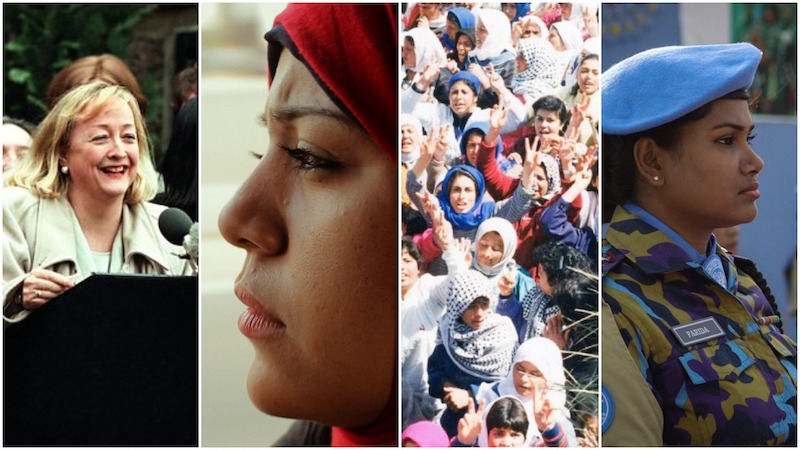Who better to tell the story of women than women? In its second installment, the PBS documentary series “Women, War & Peace” returns for a second series on Monday, March 25 and Tuesday, March 26, 9 to 11 p.m. on PBS (check local listings) with four stories about women involved in conflicts in Northern Ireland, Egypt, Gaza, Bangladesh and Haiti.
This second series includes four episodes—three of which already made the festival rounds as feature films and only one, “Wave Goodbye to Dinosaurs,” which was made specifically as a one-hour television documentary. Three documentaries highlight Muslim women. These documentaries are brutally honest with segments that some people might find disturbing—scenes of police brutality, terrorism and the aftermath of murder. Taking all the films together, the four part-series changes the narrative of who women are and what they can be.

Directed by Irish filmmaker Eimhear O’Neill and originally released in 2017, “Wave Goodbye to Dinosaurs” (Monday, March 25 at 9:00 p.m.) follows the all-female cross-community political party of Catholic and Protestant women in Northern Ireland that formed in 1996 and demanded and won two seats at the historic peace talks for the Good Friday Agreement. One woman says what passed for politics at the time was “tribal, aggressive and bigoted” The group, the Northern Ireland Women’s Coalition, fought to ensure policies around human rights, equality, and inclusion were reflected in negotiations, but the group only had one unifying goal: peace.
The two seats were taken by a Catholic academic, Monica McWilliams and a Protestant social worker, Pearl Sagar, and they often faced male chauvinism from the male members at the peace talk table. Former Senator George Mitchell, who was Chairman of the Northern Ireland Peace Talks, notes that the women were more focused peace instead of how one community could better benefit over another. You listen to the Northern Irish men talking about how good Ulster women behave, it’s easy for forget that Northern Ireland as part of the United Kingdom had a queen and a female prime minister (Maggie Thatcher from 1979 to 1990).
Americans might not be aware of that The Troubles or what we know as the Northern Ireland conflict started as a civil rights movement; Irish Catholics were demanding equal rights and protections against discrimination. There was a time in recent memory when London seemed to be on continual alert for bombs with subways closing temporarily and bicycles being dismantled for being chained particularly politically important real estate. In light of Liam Neeson recent comments, it’s interesting to consider what it was like for women during The Troubles and that Bernadette Devlin, the youngest MP ever elected (until 2015 ), feels that “sectarianism and racism” were “the same disease” and this was why she thought the African American women protesting in the Deep South were kindred spirits. Filmmaker O’Neill juxtaposes the situation in Northern Ireland with the Civil Rights protests in Alabama. Devlin rose to prominence in 1968 and served as an MP for Mid Ulster from 1969 to 1974.
The now 71-year-old Bernadette Devlin McAliskey gives this series one of its best quotes: “It’s not that women get written out of history, they never get written in.” But she also notes that “The coalition was a peace party, not a party for the advancement of women’s rights.” So ironically, while the coalition used the slogan, “Wave Goodbye to Dinosaurs” in reference to old-style politicians, as a political party itself, the coalition fell into extinction. Yet Mitchell states they played a crucial role in the peace negotiations and the ending implies that the coalition did make a difference.
For director O’Neill, her documentary shows “the importance of diversity and gender equality in political representation.” and for an American audience “the desire for female voices that are outspoken, relentless and committed to addressing the issues that matter to people’s day-to-day lives” can be seen in the “record number of women” who “now serve in the House of Representatives.”

Emmy®-winning and Oscar® nominated filmmaker Gini Reticker, one of the original directors of the first series, returns with “The Trials of Spring” (Monday, March 25 at 10:00 p.m.). Initially release in 2015 at 90 minutes, this documentary follows three Egyptian women who fought for justice during Egypt’s Arab Spring in 2011: the Muslim Hend Nafea, the Christian Mariam Kirollos and a woman who became the den mother for the female protesters: Khadiga Hennawi.
When the revolution began against then-President Hosni Mubarak, there was a feeling of euphoria and community in Cairo’s Tahrir Square, but that quickly changed after Mubarak left office in February 2011. The problem of sexual assault and harassment of women wasn’t rare before, but became alarmingly commonplace and women couldn’t necessarily count on law enforcement to help. One woman complains, “These men quoting the prophet and the Quran and the same men who sexually harassed us.” Military forces detained a group of women and forced them to submit to “virginity tests.” The military officer who defended such practices publicly is now Egypt’s president, Abdel Fattah el-Sisi.
Nafea is the emotional center of the movie, suffering physically during the military crackdown when she was dragged, beaten and then stripped. For her demonstration against the military rule, she was convicted in absentia to a 25-year sentence, having by then fled the country first to Lebanon and eventually to the United States where she is a now executive director and co-founder of the U.S.-based NGO Human Rights Port, an organization that provides and protection for human rights defenders and civil society activists in Egypt and the greater MENA region. She also co-founded Watan Bila Ta’azib (‘A Nation Without Torture’), a campaign to bring an end to torture in Egypt, and in the documentary, she says, “A nation without torture is a dream that can come true.”
“The Trials of Spring” was the centerpiece of a major media event which included six short documentaries on women who played prominent roles in their countries during the Arab Spring. “The Trials of Spring” won the New Media Film Festival Award at the New Media Film Festival for best Socially Responsible Content in 2016 and the Founders Prize at the 2015 Traverse Film Festival.

Peabody-winning director Julia Bacha takes us to 1980s Gaza in the 2017 “Naila and the Uprising” (Tuesday, March 26 at 9:00 p.m.) which explains the central role Palestinian women played in the First Intifada of the late 1980s through the story of Naila Ayesh.
Using 2D animation, the documentary takes us back to when an eight-year-old Naila was living Ramallah on the West Bank and first knew the consequences of the Israeli forces, coming home to nothing but rubble. The Israelis have destroyed her home that seems to have been in the family for generations. As the years pass, Naila grows up as a second-class citizen, increasingly hostile toward the Israeli military occupation of Gaza and the West Bank where she and other Arabs are under curfews and other restrictions.
Naila meets and marries another Palestinian, Jamal, and together back in Palestine. Bacha wrote in an email that Naila’s backstory was trimmed for this TV version, leaving out “her studies in Bulgaria, her courtship with Jamal, and their wedding back in Palestine.” They are both activists but it is Naila who is arrested while pregnant with their first child. Thrown into jail, she spends nights in the cold rain and eventually miscarries. She is only saved when Jamal finds a sympathetic Israeli journalist to look into her case and inhumane treatment.
When you think of the current conditions in Gaza and the West Bank, something that’s hard to criticize in the US without be accused of anti-Semitism, it might seem hard to be optimistic. But Naila remains resilient and we learn her oldest son is studying law in Canada.
The animation mitigates some of the horror and helps bridge the gaps where archival footage wasn’t available. Bacha related via email that the archival footage “came to us via a Finnish documentary about Naila’s life by Iikka Vehkalahti called ‘Amal, Inam, Naila.’ That footage became central to our ability to tell the story of the women’s movement during the First Intifada through Naila’s experience.”
Bacha wrote the most important theme of the documentary is that “Palestinian women took the helm of the First Intifada in crucial ways and had an indelible impact, both on the quality of resistance that took place (largely unarmed, strategic and mass-led) and the durability of the uprising.” Also she felt that the film shows “nonviolent civil resistance is an age-old and widely employed tactic in the region that gets far too little attention in the mainstream media.”

Like “The Trials of Spring” and “Naila and the Uprising,” “A Journey of a Thousand Miles: Peacekeepers” (Tuesday, March 26 at 10:00 p.m.) broadens our understanding of the role of Muslim women in their own countries and the world. The journey is from Bangladesh to Haiti. Over a hundred female police officers from Bangladesh leave their families for one year (June 2013 and July 2014) in order to be part of the UNs MINUSTAH (an acronym for the French name Mission des Nations Unies pour la stabilisation en Haïti) team in Haiti.
The first MINUSTAH arrived in 2011 but mission ended in 2017 (to be replaced by the United Nations Mission for Justice Support in Haiti). While the documentary doesn’t drag us through the muck, there’s plenty of that to be raked: MINUSTAH male soldiers were accused of sexual assault and misconduct. Thus, an all-female police force sounds like a good idea, but the good is mixed with the bad: The women are ill-prepared although we see them training in Bangladesh. They require more weapon and crowd control training and they never seem to get an education on the local language. They are not forewarned that they are especially unwelcome after accusations are made that the management of the previous teams resulted in a cholera outbreak in 2010.
While the documentary shows protests against the MINUSTAH and interviews protesters about their grievances, Gandbhir and Obaid-Chinoy don’t dig deep into the dirt here, but, instead focus on two of the peacekeepers.
Farida Parveen, assistant sub-inspector, whose father didn’t encourage her to join the police force although he was a police constable, but her mother, Karuna Bibi, likes that her daughter has a career. Parveen is married to a businessman who doesn’t approve of her journey to Haiti, but Parveen still goes, partially because of her son from a previous marriage.
Mousumi Sultana, sub-inspector, section commander, witnessed domestic abuse in her family and was determined to help women out of those situations. Her husband is sweetly supportive while Parveen’s husband can be somewhat petulant. Women officers are mostly assigned to administrative jobs in Bangladesh, including crisis centers. The scene from the crisis center in Bangladesh is not one for the squeamish and neither is a homicide scene we’ll later see in Haiti. Signing up for the MINUSTAH year is a way of moving up the ranks, but it is also an incredible hardship on the families, especially the children who give sweetly honest interviews.
In a telephone interview, Gandbhir noted that a third peacekeeper’s story was originally included (Rehana Parvin) but was edited out for the transition to television. Both Parveen and Parvin faced opposition to their work and their participation to the mission, but Parveen was the stronger story with the direct opposition and on-camera anger expressed by her husband.
The film originally premiered in 2015 at the Toronto International Film Festival with an hour and 35 minutes of footage. It won the Jury Award for Best Documentary at the Bentonville Film Festival in 2016 and the Humanitarian Award at the 2016 RiverRun International Film Festival.
Overall, the series provides examples of strong women of faith, both Christian and Muslim, who face both opposition of support from the men they associate with. For US audiences, we see Muslim and Asian women who aren’t helpless but resilient and resourceful.












